Aussiedoodle Dog Breed Temperament Diet Training Character
Aussiedoodle Dog Breed – Characteristics and Suitability
Table Of Contents
- 1 Aussiedoodle Dog Breed – Characteristics and Suitability
- 2 Aussiedoodle Breed Origin and History
- 3 Aussiedoodle Temperament and Personality
- 4 Aussiedoodle Training
- 5 Aussiedoodle Grooming
- 6 Aussiedoodle Health and Genetic Problems
- 7 Aussiedoodle Diet and Meals
- 8 Aussiedoodlle Exercise Requirements
- 9 Is Aussiedoodle the Right Dog For You?
The Aussiedoodle is a designer dog breed. It is the result of mating between two of the most intelligent dogs, the Standard Poodle and the Australian Shepherd. Being a crossbreed, the Aussiedoodle can possess both qualities of the parents. But you will never know what you are going to get.
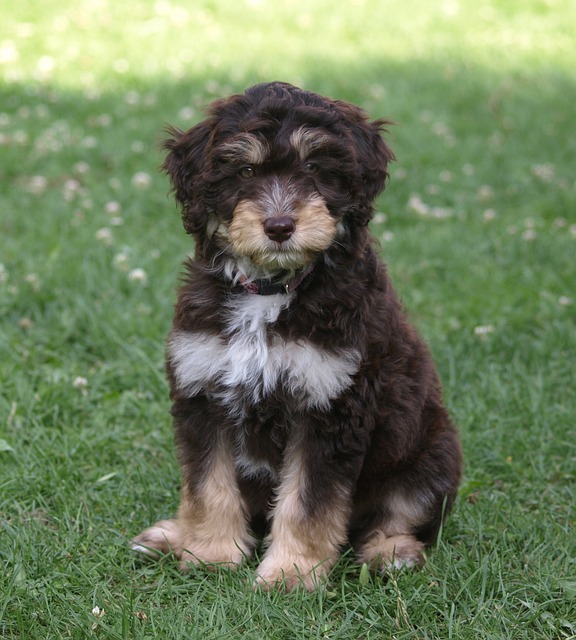
Two geniuses do not necessary guarantee a brilliant offspring. Likewise, two breeds of intelligent dogs do not guarantee nothing will go wrong. Though you can get your Aussiedoodle from a reputable breeder, there is no promise your Aussiedoodle will meet your expectations.
But again, most dog owners love their dogs as who they are, not what they expect their dogs to be.
Aussiedoodles need owners who have the energy to keep up with them. They are active and social dogs. Being a rather big sized dog, Aussiedoodles need to go for daily walks and runs. They are agile enough to take part in dog agility sports and activities.
Watch a short video on Aussiedoodles below:
Aussiedoodle Breed Origin and History
Breeders have been experimenting with cross breed dogs for decades. Some choose to crossbreed toy breeds. Examples of toy crossbreeds include the Spoodle and the Cavoodle. Some breeders do it retain the positive traits of the purebreds in the crossbreeds. While there are others who wanted to achieve a certain look, character or capability.
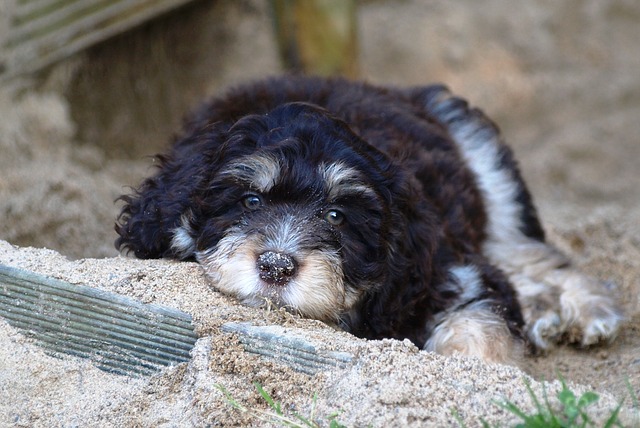
But its not easy to be consistent. One way to control is to ensure that the parents are free (or almost free because can never be sure) from inherited disabilities. And they have to breed over several generations to have predictability in results. When crossing the Poodle and the Australian Shepherd, the bitch is usually the Australian Shepherd. This is because breeders are afraid that the puppies might be too big for the Poodle to take.
As with many designer dog breeds, Aussiedoodles are not recognised by the American Kennel Club (AKC). But they are recognised by the American Canine Hybrid Club, the Designer Dogs Kennel Club, the International Designer Canine Registry and the Designer Breed Registry.
Let’s take a look at the parents of the Aussiedoodle, the Standard Poodle and the Australian Shepherd.
The Standard Poodle
The Poodle is the second most intelligent dog just behind the Border Collie. The origins of the Poodle is debatable. Some say it originated from the old French Barbet breed while some insist that it originated as a water dog in Germany.
The Poodle is a beautiful dog with graceful lines. It excels in many dog sports and activities, including agility tests, obedience challenges, tracking to herding and assistance dogs. Due to its graceful appearance, the Poodle is often the favorite dog breed of many celebrities.
Poodles are easily trained due to their high intelligence. They are energetic and sociable. Together with the fact that they do not shed, Poodles are naturally a favorite choice among many dog owners.
The Australian Shepherd
The Australian Shepherd has been valued by many owners for their versatility and intelligence. They are highly obedient and demonstrate eagerness to please their owners. Australian Shepherds revel in tasks such as frisbee retrieval, herding duties and rescue missions.
Often, many refer the Australian Shepherd as “Aussie”. However, the Australian Shepherd was developed on the ranches in the Western United States in the 19th century. Nobody knew how the dog breed came into Australia though there were a few theories.
Studies have discovered that the Australian Shepherd is closely related to the Border Collie, That explains why the Australian Shepherd is such an intelligent dog. Some organisations use the Australian Shepherds as guide dogs, service dogs and therapy dogs. Picking up tricks is a piece of cake for Australian Shepherds.
Thus, with such a good pedigree, it is no wonder the Aussiedoodle is in hot demand all year round.
Aussiedoodle Temperament and Personality
Temperament of dogs depends very much on their parents. However, temperament can also be influenced by the environment too. Thus, each dog has their own attitude and behavior. Aussiedoodle puppies are likely influenced by their mother, which is usually the Australian Shepherd.
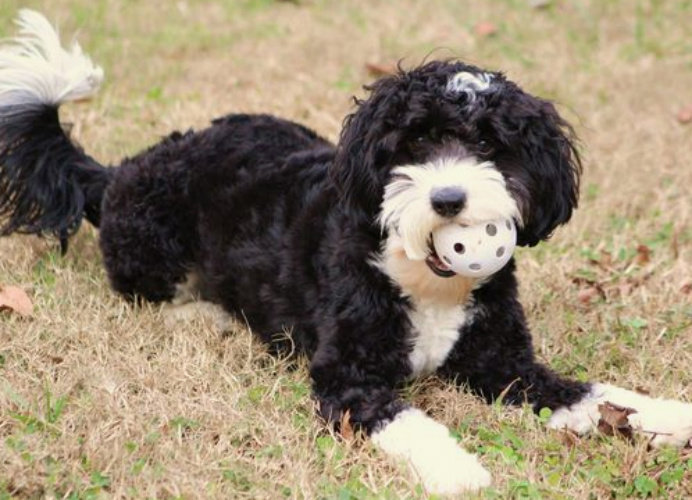
Most Aussiedoodles are friendly and sociable dogs. They serve their families well and remain loyal to them. However, there are some things you should look out for.
Being a herding dog, the Australian Shepherd was bred to bring livestock together. It is natural for the Australian Shepherd to herd. In some Aussiedoodles, such instincts are acquired from their parent. As such, you might see your Aussiedoodle trying to herd your kids by nipping and touching them. Do note that such actions are not signs of aggression. It’s just a natural instinct passed on to him.
Aussiedoodles are intelligent dogs. But you have to let them know what is acceptable and what is not. If the herding behavior gets too overwhelming, you should stop such behavior immediately with a stern “Stop it” or “No” command. This has to be done to stop unacceptable behaviors.
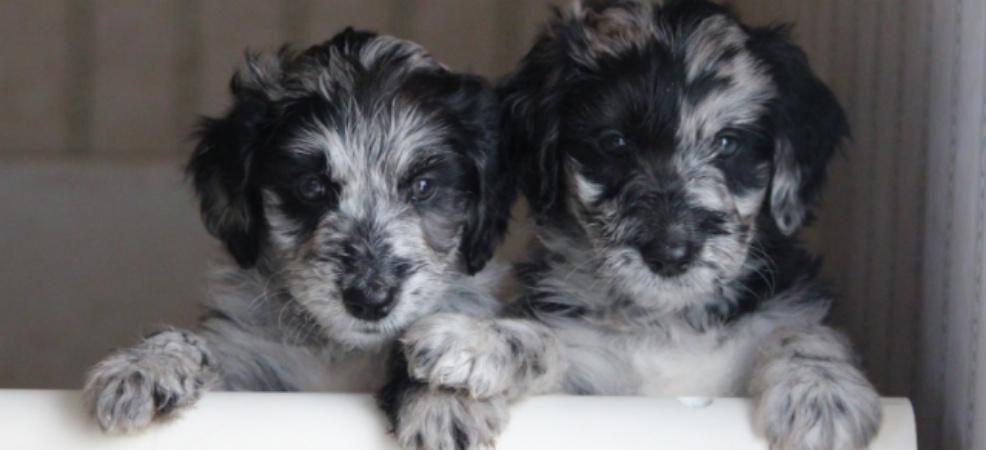
Aussiedoodles are usually friendly to people and other animals. If you find the Aussiedoodle puppy at the shop displaying aggressive behavior, avoid the puppy at all costs. There might have been earlier incidents that has left emotional scars on the puppy. Unless you are a very patient dog owner, overturning such negative experiences can be an uphill task. Choose your Aussiedoodle Puppies carefully.
Aussiedoodle Training
Training an Aussiedoodle is always a great pleasure. They are eager to please the owner and will try their best to understand what you want to achieve. Aussiedoodles response well to positive reinforcement training. Any physical punishment will reduce the trust your Aussiedoodle has in you.
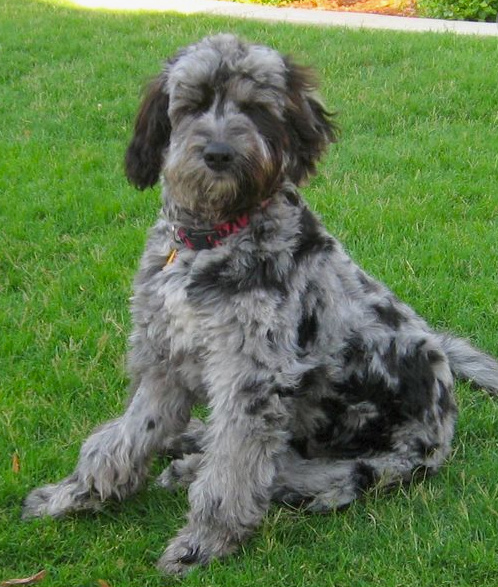
Harsh, outdated training methods should not be used on Aussiedoodles. To ensure quick training success, you have to exhibit a firm and calm demeanour. Never show anxiousness or nervousness during training as it will slow down your dog’s learning process.
Start training your Aussiedoodle puppy as soon as possible. You can start training your Aussiepoodle as early as 8 weeks old. Delay training your puppy and you might face difficulties. If you do not have time to train your Aussiepoodle, send your puppy to a puppy school to acquire basic obedience commands.
Other than formal training, expose your Aussiedoodle to other friendly dogs. Let him socialise as much as possible at an early age. Introduce other family members to your new puppy as soon as possible. Get your puppy used to human interaction and love early and you will have a balanced dog.
Watch an Aussiedoodle undergoing training:
Aussiedoodle Grooming
The coat of Aussiedoodles need minimal maintenance, thanks to the Poodle being one of the parents. Aussiedoodles shed very little or they do not shed at all. However, your Aussiedoodle still need regular brushing and combing to prevent matting. Brushing is best done everyday while you are spending some quiet time with him, or just watching television with your dog.
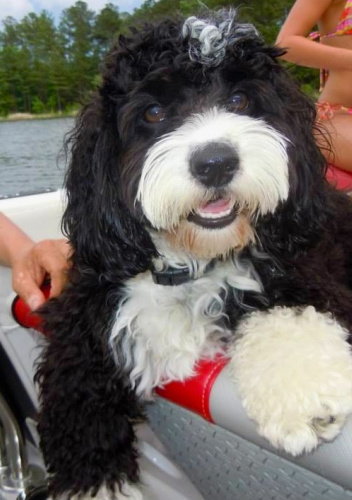
Professional grooming should be done every 6 to 8 weeks. Without grooming, your Aussiedoodle can look like a mess within a short time. Many owners prefer the “Teddy Bear Hair Cut” for their Aussiedoodles, which is a short hairstyle leaving about an inch of coat all over. The nails should be clipped on a regular basis to prevent pain while walking.
Clean the ears of your Aussiedoodle regularly. Hair might grow inside the ears, so you might need to pluck them out to prevent ear infections. Keep their ears clean and dry. Bring your Aussiedoodle to the vet if you see any discharge from the ear.
Brush the teeth of your Aussiedoodle at least three times a week. Failure to do so will allow plaque and cavities to attack. Premature loss of teeth is a tragedy for any dog. It might just take a few minutes of your time but it means a lot to your Aussiedoodle. If they are reluctant to have their teeth brushed, use positive reinforcement to train your dog. Offer a treat after every teeth cleaning session and soon your Aussiedoodle will be looking forward to it.
Aussiedoodle Health and Genetic Problems
Even though you have done lots of homework and research on your Aussiedoodle’s parents, there is no guarantee that health problems will not arise. Most breeders will offer a health guarantee on their puppies. It is common practice for breeders to highlight that their Aussiedoodle puppies are 100 percent healthy and has no physical or medical problems.
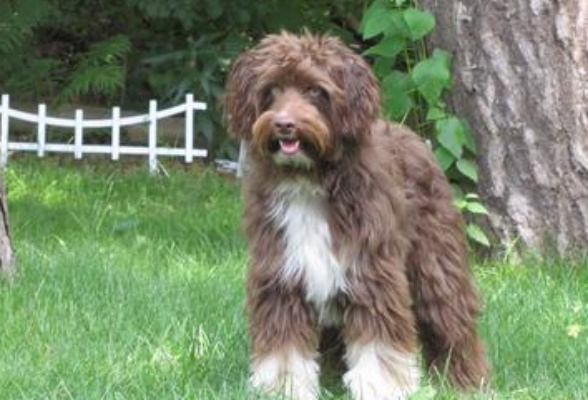
It is of common belief that crossbreeds tend to bring the best, instead of the worst, of both breeds. Still, your Aussiedoodle may inherit certain health problems of both the Poodle and the Australian Shepherd. It is hard to predict what are the possible inherited shortcomings. But it is good that you are aware of the common health problems in Poodles and the Australian Shepherd.
The Australian Shepherd is susceptible to vision problems and epilepsy. Health problems of the Poodle include Addison’s disease, gastric dilatation volvulus, thyroid issues, tracheal collapse, epilepsy. sebaceous adenitis. renal disease, hip dysplasia, and cancer.
The good news is, there is not much documented health problems with Aussiedoodles. One of the more common problem is hip dysplasia.
It is hard to detect any health problems in Aussiedoodle puppies. Signs of genetic health issues are not apparent in puppies. It is also hard to predict the chances of your Aussiedoodle having health problems. That’s why you should always seek out a reputable and honest breeder for your Aussiedoodle. A reliable and honest breeder will show you independent certifications that the parents of your prospective Aussiedoodle are sound and free from common health defects.
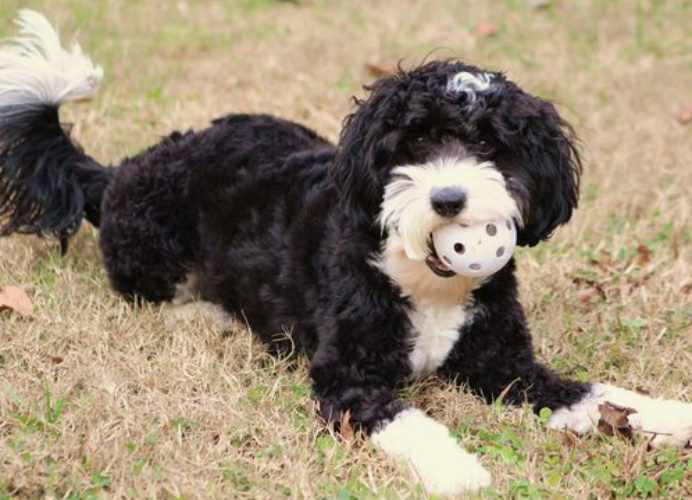
At times, you will encounter breeders who do not keep proper records of the parents’ health history. Such breeders cannot be trusted. If they do not take effort to keep proper records, how will they ensure the quality of their puppies? Always insist on a breeder who thoroughly knows the lineage history of the puppies.
No matter how careful the breeder is in selecting the best quality parents, there is always a chance that the recessive genes finally show up. Good breeding practices does not provide a warranty on the health of your Aussiedoodle. Nonetheless, it is still better to take extra care in breeder selection.
The good news is, with the advancement in veterinary medicine, many of the common ailments of dogs can be cured. An early visit to the vet, coupled with regular routine checkups, will ensure a healthy Aussiepoodle. However, one of the most common health problem is not caused by genetics, but by the owner. The problem is called obesity.
Aussiedoodle Diet and Meals
Puppies under six months old should be fed 3 times daily. Aussiedoodles older than 6 months should only be fed twice daily. Arrange the meals at fixed times so that housetraining and his poop times are predictable.
The best time for the first meal is around 7am. Second meal at 12pm and dinner at 5pm. No food should be offered to your puppy after 5pm. This is to ensure that your puppy has enough time to digest the food before bedtime. As your puppy approaches 6 months old, it is advisable to seek your vet’s advice on the transition to a 2-meal feeding schedule.
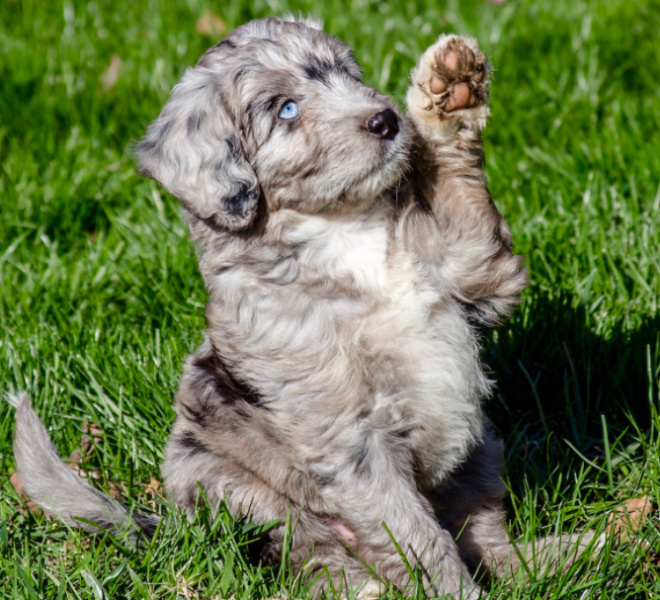
Always select the highest quality food available. Read the fine prints of your dog food. If it consists of grain and other undesirable ingredients, avoid at all costs. The low quality dog food may come at a cheaper price, but it will cost you more dearly in medical bills due to malnutrition. One of the better quality dog food is the Acana series which have worked well for our dogs. You can find more information here.
You can also prepared cooked meals for your dogs. But be careful not to leave your cooked food exposed for more that 2 hours as they might turn bad, leading to a major stomach upset for your Aussiedoodle. Feed your dog as soon as the temperature of your cooked food is right. Here are some foods you can include in your Aussiedoodle diet:
Peanut Butter : The smell of peanut butter will make any dog go wild. It is a very healthy source of protein and healthy fats. When you have peanut butter into a Kong Toy, you can guarantee that your Aussiedoodle will be occupied for hours. Always select raw and unsalted peahut butter. Read the labels carefully, those “sugar free” peanut butter containing xylitol are poisonous to dogs and should be avoided at all costs.
Cooked Chicken : This is provided that your dog is not allergic to chicken meat. Some dogs develop rashes after consuming chicken. When you run out of dog food, a piece of boiled chicken will drive your Aussiedoodle crazy.
Cheese: Lactose tolerant dogs can be fed cheese as a treat. However, do not feed your dog cheese everyday as cheese contains fat.
Carrots : The natural sweetness of carrots is a major attraction for many Aussiedoodles. Nutritious and healthy, carrots can be fed to your Aussiedoodle on a regular basis.
Salmon : To have a healthy coat, Aussiedoodles need to have essential oils in their diet. There is no better way to include than giving your Aussiedoodle a Salmon meal. Cooked salmon contains omega 3 fatty acids that can enhance the coat of your Aussiedoodle
Pumpkin : Pumpkins are a good source of fiber and Vitamin A. Not to mention most dogs crave for pumpkins!
Eggs : Eggs are one of the best sources of protein for your Aussiedoodle. But control the number of egg yolks though. Eggs are also a healthy source of riboflavin and selenium. Riboflavin helps your dog’s body harness energy from food, while selenium helps to prevent cancer and heart diseases.
Apple : Apples are a fantastic source of fibre for your Aussiedoodle. It also helps to clear off residues on your Aussiedoodle’s teeth. BUT remember to remove the core and the seeds of the apple before feeding them.
Oatmeal : Older dogs with bowel trouble can benefit from an occasional bout of oatmeal. Cook the oatmeal without added sugar or flavoring. Your Aussiedoodle will find it very delicious.
Like all dog foods, do not feed enormous amounts at the beginning. Mix new additions of dog food gradually with existing dog foods. Drastic changes in food causes stomach upsets. You would not want your Aussiedoodle to go through stomach pains.
Aussiedoodlle Exercise Requirements
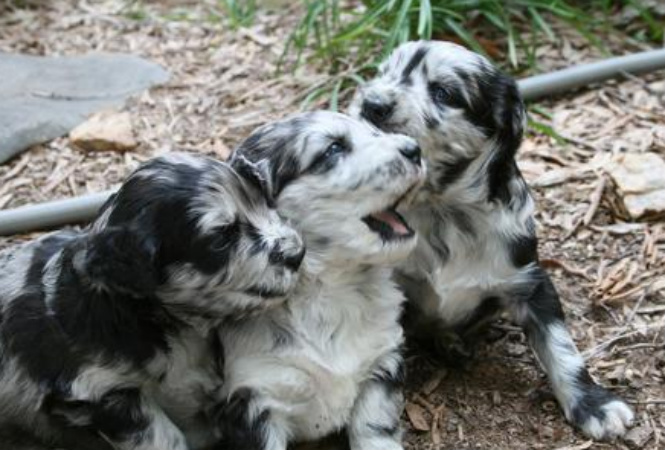
Aussiedoodles are high energy dogs. Owners should take every effort to bring them out for daily walks. Aussiedoodles are great companions for long walks and runs. If you can teach your Aussiedoodle some easy dog tricks, that will be a great way to stimulate them. Here is a list of easy dog tricks for your Aussiedoodle.
Is Aussiedoodle the Right Dog For You?
Overall, if you are looking for a friendly and loyal dog for your family, the Aussiedoodle will be the perfect fit. Aussiedoodles need a loving home with loving companionship. If you are a dog lover and do not mind the regular grooming sessions, then the Aussiedoodle is for you.
We got an aussiedoodle puppy from a breeder at 10 weeks old. She will be 4 months old tomorrow. She can be very sweet and very mean. She is aggressively mean. It occurs mostly when I take her for a walk, about half way in or at the end of the walk she often becomes very aggressive biting and growling at me. It is out of control and there is nothing I can do. She is biting my leg, growling and does not let up. It is also difficult to do anything with her (play or pet) because she always starts biting. I have tons of toys and bones and offer those in place of my hand. I love her, but I am very upset and saddened by this as I cannot have an aggressive dog that is going to bite. It really is not normal puppy biting or behavior. Please Help!!
Hello.
From my experience, I think you are worrying too much for now. Bitting at hands is a totally normal puppy behavior. My poodle did that until he was 1 years old. He just wants attention and what you need to do is cut out social contact when he does that. You get up, say NO and walk away and ignore him for 5 minutes or longer if needed. Sometimes I would just lock myself in my room for 5 minutes, let him in and if he did it again repat until he would stop. Just be patient with your puppy.
I have a 5 year old aussiedoodle and we went thru the same thing. Your dog is part herding breed and that is what you are seeing. Mine loved to grab my pant legs. It is really play, even though it sounds dramatic. You just need to redirect. It is rough puppy play. Believe it or not, it does pass. My dog is a sweetheart and adores everyone, but was so aggravating at times (as a puppy) Hang in there. It is so worth it. (Most all breeds play rough and are mouthy…you can google ways to stop the it and find what works for you.)
We have had our Aussiedoodle for about a week and couldn’t be happier. He has a great temperament and is super intelligent (he is already sitting and lying down on command). We are feeding him Buffalo Blue and he seems to be responding well. Again, we are one week in so we are at the early stages of the learning curve. So far, so good.
My Aussiedoodle was doing the same thing. He ruined several pairs of jeans with those miserable puppy teeth. I started wearing leather boots and saying a lot of NO! I used the cardboard from the inside of paper towels to swipe him. He hates the sound. He’s now 5 months and pretty much out of the habit. He still tries to control me every once in a while.
It’s the herding instinct in them. You just have to show her you’re the alpha dog.